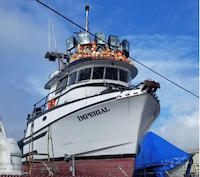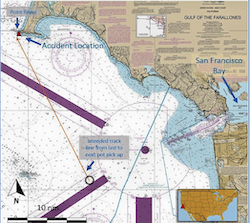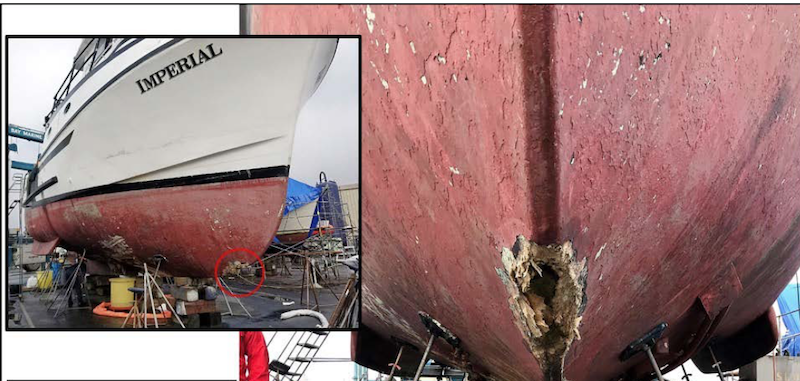Sleep deprivation is something that all mariners but especially commercial fishermen have to deal with.
Many fishermen feel compelled to ignore sleep deprivation’s built-in dangers — inattention, sloppy work, injuries, collisions, sinkings, drowning — with an “I’ll catch up on my sleep later” mind set, especially if they are in a derby fishery or the season is ending and you’ve only got a few days left to fish. Thus, you fish as much and as fast as you possibly can.
One of the National Transportation Safety Board’s recent marine accident briefs emphasizes what happens when you succumb to sleep deprivation. That was the Dungeness crabber Imperial that grounded near Point Reyes, Calif., on Nov. 19, 2018, at 4:45 a.m. Pacific Standard Time.

The Imperial on blocks after recovery. Coast Guard photo.
The 52-foot fiberglass Imperial’s crew of four deckhands and a skipper was engaged in a Dungeness derby fishery, which pretty much required filling up in the first week or so because after that it would be scratch fishing.
The Imperial started setting its pots on Nov. 14, a day ahead of the opening, which was allowed, and began hauling back pots at one minute past midnight. From then on, the crew drove it hard, hauling pots, emptying them, baiting, resetting and sorting crab. There was no sleep for the skipper in those first 24 hours. After that, he accumulated 4, 6, and finally a total of 10 hours sleep in 96 hours, as he sought to maximize the catch.
By the early morning of Nov. 19, 40,000 pounds of Dungeness crabs were aboard when the Imperial set off to pick up the remaining pots, 19 miles away near Point Reyes, after which the crew would head to San Francisco to unload. They took time to nap on the two-hour run to the pots. The skipper — after getting only 10 hours sleep in four days of fishing — used the automatic pilot to steer to the crab pots.
It wasn’t long before he fell sleep, having failed to set the bridge alarm system. At 4:45 a.m., he was awakened by the vessel’s violent shaking and saw rocks and breaking surf around him and the cliffs of Point Reyes immediately in front.

The Imperial was heading to pick up its last crab pots when it crashed onto rocks at Point Reyes. NTSB image.
Crashing on the rocks had opened the hull at the bottom of the bow, allowing water in the engine room. After having portable pumps delivered, the Imperial was towed into San Francisco. There were no injuries but $950,000 damage.
The NTSB determined that “the captain failed to monitor the vessel’s track as a result of fatigue due to an accumulated sleep deficit.” In all probability, the failure to activate the wheelhouse watch system was also a result of fatigue. Contributing to the accident was the “derby-style Dungeness fishery in the state of California, which results in continuous fishing operations at the beginning of the season.”
As part of its report, the NTSB mentions several other recent accidents where fatigue was a major factor. That includes the Titan, which sank Dec. 2014 near Cape Disappointment, Wash.; the St. Dominick that grounded in Pumicestone Bay, Alaska, on March 6, 2017; and the Savannah Ray, which grounded at Kodiak Island in February 2015. In all these cases, “the captain failed to monitor the vessel’s track as a result of fatigue due to accumulated sleep deficit.”
The NTSB also notes that the crew of the Destination, which capsized and sank Feb. 11, 2017, had long hours working “the derby-style cod and opilio crab fisheries.” Six men were lost in that accident.







